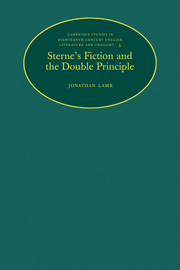2 - Originality and the hobbyhorse
Published online by Cambridge University Press: 05 February 2012
Summary
When Sterne invented the Shandy family and its satellites he broached a set of dilemmas that tormented the eighteenth century. Whether they were posed in economic, political, moral, Christian or philosophical terms, these amounted to the impossibility of reconciling notions of primitive innocence with the facts of civilised society. As Britain developed ever more sophisticated patterns of financial and social relations, the opportunity of locating any point of coincidence between the satisfaction of private appetites and the fulfilment of public duties became correspondingly remote. J. G. A. Pocock's influential analysis of this rift turns on the conflict between the values associated with the ethos of civic humanism, ‘in which the ego knew and loved itself in relation to a patria’, and the evidence of the progress of corruption, ‘a chaos of appetites, productive of dependence and loss of personal autonomy, flourishing in a world of rapid and irrational change’. The writing of these disturbing times is filled with complaints against the symptoms of degeneracy, such as the growth of London and the increase of metropolitan vices, interspersed with pictures of embarrassed or exiled virtue. Very often these pictures idealise as well as explain the marginal condition of characters who have chosen to preserve their integrity against the odds, as in novels like Clarissa, The Vicar of Wakefield and Humphry Clinker, or a poem like London.
When the idealisation of marginal virtue is done in the discourse of civic humanism, it becomes especially difficult to order the language of praise and blame.
- Type
- Chapter
- Information
- Sterne's Fiction and the Double Principle , pp. 31 - 55Publisher: Cambridge University PressPrint publication year: 1989

